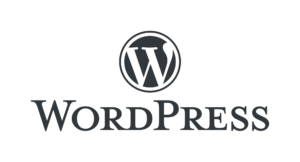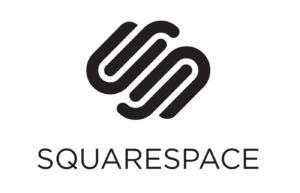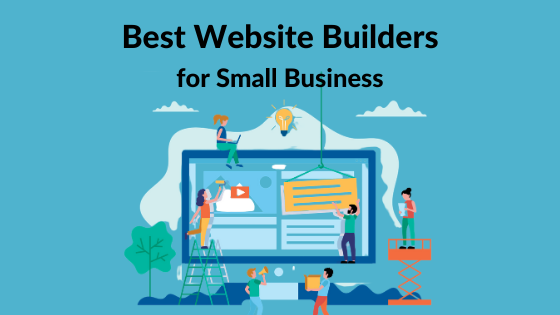Best Website Builders for Small Business

Deciding on the best website builder for your small business can be nerve-racking and overwhelming. There are many options out there, and many seem very similar – so, which one is right for you? Making a poor choice could cost you loads of time. Additionally, it could create massive headaches when trying to migrate your website to a different hosting platform. Unfortunately, I’ve seen this keep many small business owners from taking any action at all!
Inaction is probably the worst route, but it is too common. How do you decide which website builder is best for your small business? It depends from business to business, but this list should help you discern the differences between some popular website builders for small businesses.
Table of Contents

1. WordPress
39% of websites are built on WordPress. It is ubiquitous, and it’s easy to see why: it’s inexpensive and fully customizable. Need a small website to showcase your food photography hobby? No problem. Need to build a website for your $50 million enterprise SaaS company? You can do it on WordPress.
In addition to the qualities mentioned above, WordPress has been around for a long time. When it first came on the scene as a simple blog builder, it made an open-source platform for developers to create apps, plugins, or templates that other WordPress users could implement on their site. This open market approach generated a massive influx of developers producing amazing plugins and website theme templates. These days, whatever you want to do with your website, from e-commerce to SEO to social media integrations, there’s most likely a plugin that can get the job done.
Why Choose WordPress?
Since WordPress has been around for so long, they’ve had plenty of time to beef up their security, suite of hosting services, user interface, and more. Some users might still want an additional security layer and get DDoS protection, just to be sure. In most cases, this is not really needed, but one can never be too careful. Because WordPress is so comprehensive, there is a learning curve when using it for the first time. It may not be quite as intuitive as some of the other website builders, but it is powerful. WordPress makes it easy whether you want a plug-and-play template or to build your own pages in HTML and CSS.
Ease of Use
Price
Features
Customization

2. Constant Contact Website Builder
Constant Contact is an email marketing platform that has been around since the early days of email marketing. It started by helping businesses and organizations send emails to their lists, then expanded into website building and hosting.
Constant Contact is still an email marketing company at heart. That identity is apparent when looking at its website packages. Many businesses focus heavily on email marketing and only need a simple website or online store. Constant Contact makes it easy for these small businesses to put their email marketing and website under one roof.
Why Choose Constant Contact?
They claim to have a website builder A.I. that will design and build a website for you. While this sounds a little gimmicky, I’m sure that they’re able to pull loads of proprietary data from the industry-specific emails they send to inform their algorithms. Plus, by analyzing successful existing websites, this A.I. could have some good insights for those who have no idea where to start when it comes to website design.
Already have an audience through your email list? Don’t need much in a website? Great, Constant Contact is a solid choice.
Ease of Use
Price
Features
Customization

3. Wix
Wix is one of the fastest platforms to get a website up and going. When you first build a website with Wix, they ask a series of questions that helps inform them on what some of your needs in a website will be. They’ll then serve up templates and plugins that similar small businesses use. You can implement them right away in the simple, drag-and-drop design interface. If you’re looking for a website you can set up in a short amount of time with a few features and an attractive design, Wix has it.
The downside of Wix is that for all its ease of getting started, it can be challenging to change your website’s template or hosting. If you want to change core features or move to a different platform, be prepared for some headaches.
Why Choose Wix?
Wix has many stunning design templates. For those without an eye for design, Wix can handle it for you and help you get a website you’ll be proud to show off to your audience. Want to make a few changes to your home page? Their back-end interface is simple and intuitive. However, if you have some integrations or neat functions you want to be added to, you might not find them with Wix.
Ease of Use
Price
Features
Customization

4. Squarespace
Squarespace is intensely user-friendly. No design skills? No coding chops? No time? Squarespace has got you covered.
Sounds great, right? So, what’s the downside?
It is extremely limited in many ways that matter. With only a few dozen design templates to choose from and plugins to add, Squarespace users can’t get much when it customs to features. The same goes with customization. If you need a custom widget on the website or external integration, implementation is not so straightforward.
Why Choose Squarespace?
If Squarespace is so limited, why choose it over some of the others? Well, they’ve put a lot of money into marketing, so they’re a recognized brand name in some circles by this point, and they’re also inexpensive. Side-by-side with Wix, if your website design and features aren’t a significant factor in your decision, you can save a few dollars by going with Squarespace instead.
Squarespace is another drag-and-drop DIY website builder but with fewer design and integration options. However, coming in at a slightly lower cost, these traits can make it more appealing to some small businesses.
Ease of Use
Price
Features
Customization

5. Zyro
Zyro is a minor player in the website builder scene, but they offer a competitive product. For e-commerce businesses, you can quickly, easily build a website in minutes with their drag-and-drop interface. Their design templates are wonderfully crafted and look stunning. Zyro was developed with speed in mind, so be assured that your website will be fast. Site speed is a crucial aspect of any website in this day and age.
Even better: hosting is free!
But how is hosting free? Zyro offers a free hosting option by displaying its ad banners on your website. This is certainly not a great option if you want your small business’s website to look professional.
Why Choose Zyro?
Whether you choose with or without ads, their pricing options are appealing. For those looking to house more of their marketing efforts, Zyro offers bundled services such as email marketing. Their focus on speed and e-commerce features makes it seem like they are geared towards online-focused businesses. For those with brick-and-mortar businesses that need to prioritize local SEO, Zyro might not be the way to go.
Unfortunately, Zyro doesn’t have third-party integrations because it doesn’t have an open-source plugin marketplace. This means the number of available integrations is small. Keep this in mind if you plan on implementing unique features or external platforms.
Ease of Use
Price
Features
Customization

6. Domain.com Website Builder
Domain.com started, as you may have guessed, as a domain hosting server, offering domain names and website hosting. Creating a website builder is a natural evolution. Having these two services under one house makes it easy for someone without a website to grab their desired domain name and start building a website without worrying about connecting the website builder and hosting server. Though this website builder and hosting pairing is becoming more commonplace, Domain.com has been a player in the space for a long time. This legacy indicates that you can expect robust infrastructures, such as security and storage capacity.
Why Choose Domain.com?
Their templates look professional, and their service is uncomplicated to set up. All websites come with free SSL (security feature), easy blog setup, and analytics in a back-end dashboard. Though many other website builders offer these features, the benefit of hosting your website on the same platform is another way to streamline your digital resources.
Domain.com is inexpensive, simple, and has website building and hosting. Additionally, it doesn’t particularly favor one business model over the other. The only limitations here are the options available as you grow your business. Typically, a website grows along with a company and expands and scales up regularly. For this reason, Domain.com offers an excellent starting point for small businesses but may not be the best long-term solution.
Ease of Use
Price
Features
Customization

7. Weebly
Weebly almost didn’t make the list here because it is laser-focused on e-commerce, making it a suboptimal choice for small business owners driving traffic to their brick-and-mortar location. Weebly has existed for a long time but recently joined Square, the point-of-sale and payments software company. Square has been a boon to small business brick-and-mortars, offering easy point-of-sale systems and low processing fees. Weebly joining up with Square shows that they focus on supporting small businesses with simple payments and online store integrations.
Why Choose Weebly?
The payments and store integrations mentioned above are attractive to small business owners that want to unite their online and in-store sales. A website that supports an online store makes sense, but to make it even more appealing, Weebly is very inexpensive. In fact, it’s one of the cheapest options on this list (including the “free” option from Zyro).
The downside of Weebly is it is one of the most limited website builders in terms of features, integrations, and customizations. With only a few dozen design templates, it can be challenging to fit the vision for your company’s website into their restricted framework.
Ease of Use
Price
Features
Customization

8. GoDaddy
GoDaddy follows the same historical trajectory as Domain.com in that the company started by selling domain names and hosting services, then expanded into creating a DIY website builder tool. By far, one of the best features of GoDaddy is its hosting service. It is stable and secure. However, the website builder is severely limited and seems like an afterthought with a lot of room to grow.
Why Choose GoDaddy?
Simple, secure hosting is an entirely justifiable reason to choose GoDaddy. While their website builder isn’t entirely on par with the others on this list, their hosting services are robust. If and when your business refreshes its website, migration from GoDaddy to another hosting platform is easy.
Ease of Use
Price
Features
Customization

9. Peasy
Peasy is Hot Dog Marketing’s in-house website builder. Created by a small business owner for small business owners, Peasy features a pre-made framework with the heavy lifting of design and development already handled for you. No pre-existing knowledge of website building is needed, like most DIY site builders. Peasy is ideal for new to fairly new businesses with a desire to establish a stronger online presence, from companies who have never created a website to those with an outdated site that are looking to freshen things up.
Why Choose Peasy?
Peasy is, as the name suggests, very easy and a light lift for customers. With a system and development team already in place, usually all that is needed is branding and logos from the customer, along with content they want included. Often, Peasy’s content team can even create the copy for a customer and help advise and optimize copy and design from a customer’s vision. All that’s needed input on design and layout and the Peasy team does the rest.
Ease of Use
Price
Features
Customization
Conclusion
Our choice for the overall best website builder for small businesses is Peasy. It gives you the flexibility to start small and basic with easy-to-start design templates, you can request features you need, and the Peasy team will help it grow with your business as it gets more complex. You may only be at the word-of-mouth stage in your business, but down the line, you imagine email automation, branded videos, and an informative content library. Peasy can develop with you the entire way.
Are you interested in a Peasy website? At Hot Dog Marketing, our team is adept at building beautiful, responsive websites for our clients that offer the advanced features and unique integrations they need. Are you ready for an excellent website? Contact us today.
